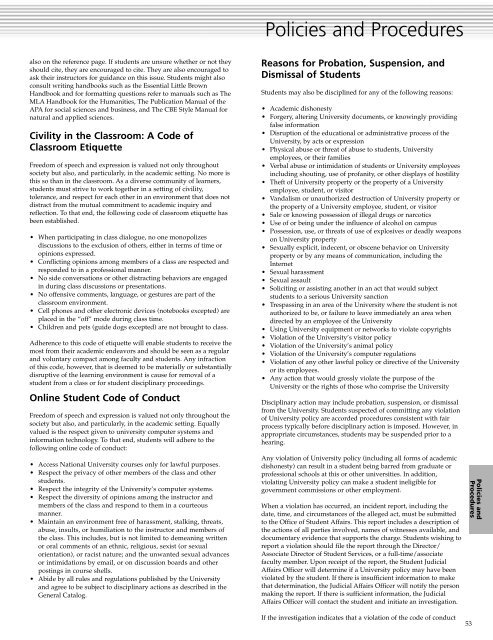Catalog 73 - National University
Catalog 73 - National University
Catalog 73 - National University
- No tags were found...
You also want an ePaper? Increase the reach of your titles
YUMPU automatically turns print PDFs into web optimized ePapers that Google loves.
Policies and Proceduresalso on the reference page. If students are unsure whether or not theyshould cite, they are encouraged to cite. They are also encouraged toask their instructors for guidance on this issue. Students might alsoconsult writing handbooks such as the Essential Little BrownHandbook and for formatting questions refer to manuals such as TheMLA Handbook for the Humanities, The Publication Manual of theAPA for social sciences and business, and The CBE Style Manual fornatural and applied sciences.Civility in the Classroom: A Code ofClassroom EtiquetteFreedom of speech and expression is valued not only throughoutsociety but also, and particularly, in the academic setting. No more isthis so than in the classroom. As a diverse community of learners,students must strive to work together in a setting of civility,tolerance, and respect for each other in an environment that does notdistract from the mutual commitment to academic inquiry andreflection. To that end, the following code of classroom etiquette hasbeen established.• When participating in class dialogue, no one monopolizesdiscussions to the exclusion of others, either in terms of time oropinions expressed.• Conflicting opinions among members of a class are respected andresponded to in a professional manner.• No side conversations or other distracting behaviors are engagedin during class discussions or presentations.• No offensive comments, language, or gestures are part of theclassroom environment.• Cell phones and other electronic devices (notebooks excepted) areplaced in the “off” mode during class time.• Children and pets (guide dogs excepted) are not brought to class.Adherence to this code of etiquette will enable students to receive themost from their academic endeavors and should be seen as a regularand voluntary compact among faculty and students. Any infractionof this code, however, that is deemed to be materially or substantiallydisruptive of the learning environment is cause for removal of astudent from a class or for student disciplinary proceedings.Online Student Code of ConductFreedom of speech and expression is valued not only throughout thesociety but also, and particularly, in the academic setting. Equallyvalued is the respect given to university computer systems andinformation technology. To that end, students will adhere to thefollowing online code of conduct:• Access <strong>National</strong> <strong>University</strong> courses only for lawful purposes.• Respect the privacy of other members of the class and otherstudents.• Respect the integrity of the <strong>University</strong>’s computer systems.• Respect the diversity of opinions among the instructor andmembers of the class and respond to them in a courteousmanner.• Maintain an environment free of harassment, stalking, threats,abuse, insults, or humiliation to the instructor and members ofthe class. This includes, but is not limited to demeaning writtenor oral comments of an ethnic, religious, sexist (or sexualorientation), or racist nature; and the unwanted sexual advancesor intimidations by email, or on discussion boards and otherpostings in course shells.• Abide by all rules and regulations published by the <strong>University</strong>and agree to be subject to disciplinary actions as described in theGeneral <strong>Catalog</strong>.Reasons for Probation, Suspension, andDismissal of StudentsStudents may also be disciplined for any of the following reasons:• Academic dishonesty• Forgery, altering <strong>University</strong> documents, or knowingly providingfalse information• Disruption of the educational or administrative process of the<strong>University</strong>, by acts or expression• Physical abuse or threat of abuse to students, <strong>University</strong>employees, or their families• Verbal abuse or intimidation of students or <strong>University</strong> employeesincluding shouting, use of profanity, or other displays of hostility• Theft of <strong>University</strong> property or the property of a <strong>University</strong>employee, student, or visitor• Vandalism or unauthorized destruction of <strong>University</strong> property orthe property of a <strong>University</strong> employee, student, or visitor• Sale or knowing possession of illegal drugs or narcotics• Use of or being under the influence of alcohol on campus• Possession, use, or threats of use of explosives or deadly weaponson <strong>University</strong> property• Sexually explicit, indecent, or obscene behavior on <strong>University</strong>property or by any means of communication, including theInternet• Sexual harassment• Sexual assault• Soliciting or assisting another in an act that would subjectstudents to a serious <strong>University</strong> sanction• Trespassing in an area of the <strong>University</strong> where the student is notauthorized to be, or failure to leave immediately an area whendirected by an employee of the <strong>University</strong>• Using <strong>University</strong> equipment or networks to violate copyrights• Violation of the <strong>University</strong>’s visitor policy• Violation of the <strong>University</strong>’s animal policy• Violation of the <strong>University</strong>’s computer regulations• Violation of any other lawful policy or directive of the <strong>University</strong>or its employees.• Any action that would grossly violate the purpose of the<strong>University</strong> or the rights of those who comprise the <strong>University</strong>Disciplinary action may include probation, suspension, or dismissalfrom the <strong>University</strong>. Students suspected of committing any violationof <strong>University</strong> policy are accorded procedures consistent with fairprocess typically before disciplinary action is imposed. However, inappropriate circumstances, students may be suspended prior to ahearing.Any violation of <strong>University</strong> policy (including all forms of academicdishonesty) can result in a student being barred from graduate orprofessional schools at this or other universities. In addition,violating <strong>University</strong> policy can make a student ineligible forgovernment commissions or other employment.When a violation has occurred, an incident report, including thedate, time, and circumstances of the alleged act, must be submittedto the Office of Student Affairs. This report includes a description ofthe actions of all parties involved, names of witnesses available, anddocumentary evidence that supports the charge. Students wishing toreport a violation should file the report through the Director/Associate Director of Student Services, or a full-time/associatefaculty member. Upon receipt of the report, the Student JudicialAffairs Officer will determine if a <strong>University</strong> policy may have beenviolated by the student. If there is insufficient information to makethat determination, the Judicial Affairs Officer will notify the personmaking the report. If there is sufficient information, the JudicialAffairs Officer will contact the student and initiate an investigation.If the investigation indicates that a violation of the code of conduct53Policies andProcedures
















